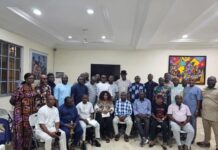Professor Sofiri Joab-Peterside, the Tribunal Judge, sitting over the Environmental Tribunal, organised by the Kebetkache Women Development and Resource Centre has indicted all the oil companies operating in the region who were accused of gas flaring and spillage, guilty as charged.
The environmental tribunal, sitting at the Luton Park Hotels in Uyo, Akwa Ibom State, on Tuesday,
further noted that gas flaring, coupled with oil spills has caused untold hardship to the environments of the appellants, resulting in the untimely deaths and destruction of the aquatic lives of the communities.
Joab-Peterside,who is also the Director, Clarke Ake School of Government, University of Port Harcourt, Rivers State, charged all the oil companies accused of gas flaring and spillage guilty as accused
Earlier, representatives of some oil-bearing communities in Akwa Ibom and Rivers States had lamented the impact of oil spills on their sources of livelihood and called on the Kebetkache Women Development and Resource Centre to ensure justice is done.
The Kebetkache Women Development is a civil society organisation committed to environmental justice and good governance.
Presenting their respective cases before the Environmental Tribunal, the aggrieved groups stressed that gas flaring coupled with oil spills has ruined their environment and led to the untimely death and destruction of aquatic lives.
A victim of one of the spills, Mr Chukwure Princewill, who is an indigene of Emohua Local Government Area of Rivers State, pointed out that his community called ‘New Heaven Avenue’ located near SPDC Nopel Pipelines, has been turned into “new hell’ as result of pipeline leakages.
He alleged that “black substances” were discovered to be ruining their source of drinking water, adding that investigations were still being carried out over the soutce and effect of the residue; which report, he assured would be made public when concluded.
While calling for relocation, he told the tribunal that his father suffered serious health challenges, such that he became hypertensive and died as a result of the challenges posed by the spills.
In her submission before the tribunal, Mrs Beatrice Ija from Iko community in Eastern Obolo Local Government Area of Akwa Ibom State told the tribunal that though the various communities have repeatedly experienced oil spills in the past and up till date, she, however, stressed that the one which occurred in the area, last week, was very devastating.
She stated, “the spill dragged into people’s farms, into the creeks, and destroy our products as well as aquatic lives.”
Meanwhile, she decried the injustice meted out to the women in the area, disclosing that a Committee set up by the local community to look into the issue excluded the women who were mostly affected by the spillage.
Earlier in her address, the Executive Director, Kebetkache Women Development and Resource Centre, Dr Emem Okon said that her association had always been taking action to address environmental challenges faced by the communities.
According to her, “We are holding this tribunal to encourage communities that their cases are not forgotten by civil society even if they have been forgotten by the government and other duty bearers.
“Civil society is always taking action to ensure that the environmental challenges that we face in our communities should be addressed.
“This is one of the measures to draw the attention of duty bearers at the national level, at the African regional level, and also at the international level to what communities are experiencing as a result of the extractive activities going on in their communities because most of what we are experiencing is in contradiction with the International Human Rights Framework that have been adopted by the governments of the world at the United Nations level on how corporations and governments should carry out business in the communities and how the relationships and interactions between the corporations and the communities should be,” she stressed.
“There are also processes of seeking redress. This also serves as awareness creation to not just communities but governments that people are monitoring what is going on and actions are also been taken to ensure that they comply with international human rights provisions,” she remarked.











